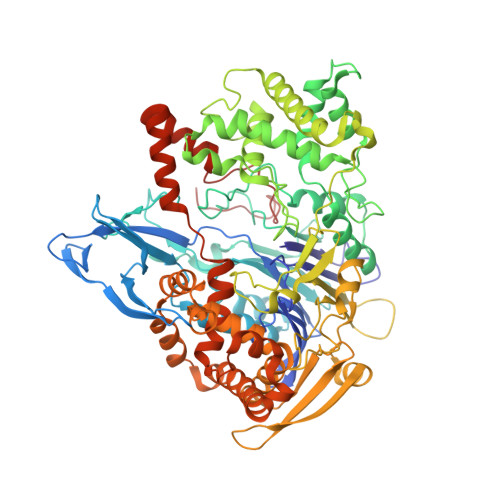A chemoenzymatic strategy for site-selective functionalization of native peptides and proteins.
Fryszkowska, A., An, C., Alvizo, O., Banerjee, G., Canada, K.A., Cao, Y., DeMong, D., Devine, P.N., Duan, D., Elgart, D.M., Farasat, I., Gauthier, D.R., Guidry, E.N., Jia, X., Kong, J., Kruse, N., Lexa, K.W., Makarov, A.A., Mann, B.F., Milczek, E.M., Mitchell, V., Nazor, J., Neri, C., Orr, R.K., Orth, P., Phillips, E.M., Riggins, J.N., Schafer, W.A., Silverman, S.M., Strulson, C.A., Subramanian, N., Voladri, R., Yang, H., Yang, J., Yi, X., Zhang, X., Zhong, W.(2022) Science 376: 1321-1327
- PubMed: 35709255
- DOI: https://doi.org/10.1126/science.abn2009
- Primary Citation of Related Structures:
7REO, 7REP - PubMed Abstract:
The emergence of new therapeutic modalities requires complementary tools for their efficient syntheses. Availability of methodologies for site-selective modification of biomolecules remains a long-standing challenge, given the inherent complexity and the presence of repeating residues that bear functional groups with similar reactivity profiles. We describe a bioconjugation strategy for modification of native peptides relying on high site selectivity conveyed by enzymes. We engineered penicillin G acylases to distinguish among free amino moieties of insulin (two at amino termini and an internal lysine) and manipulate cleavable phenylacetamide groups in a programmable manner to form protected insulin derivatives. This enables selective and specific chemical ligation to synthesize homogeneous bioconjugates, improving yield and purity compared to the existing methods, and generally opens avenues in the functionalization of native proteins to access biological probes or drugs.
- Process Research and Development, Merck & Co., Inc., Rahway, NJ 07065, USA.
Organizational Affiliation:

















